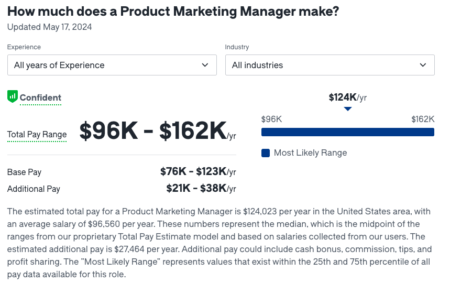![Product Marketing Manager Salary [+ Resources to Advance]](https://blog-static.userpilot.com/blog/wp-content/uploads/2024/06/Product-Marketing-Manager-SalaryResources-to-Advance-450x295.png)
Try Userpilot Now
See Why 1,000+ Teams Choose Userpilot

What is a product marketing manager?
A product marketing manager is a professional responsible for promoting and selling their company’s products.
They focus on learning market trends, defining the audience, developing positioning strategies, and differentiating the product. They collaborate with cross-functional teams like product development, sales, and marketing to ensure a product’s success.
Product marketing manager’s main responsibilities
While different companies may have varying responsibilities for this role depending on their product and market status, every product marketing manager is responsible for leading teams that bring the product to the market.
Here are their main responsibilities:
- Drive customer engagement and advocacy through customer-focused marketing initiatives such as user communities, customer testimonials, and referral programs. They promote the right features of the product to the right users at the right time.
- Responsible for pre-launch and post-launch activities of the product. They develop product positioning, messaging, and value propositions tailored to different target audiences in the market.
- Collaborate with product teams to understand product features, benefits, and competitive advantages, translating them into effective marketing strategies.
- Plan and execute go-to-market strategies for new product launches, including developing launch plans, pricing strategies, and promotional campaigns.
- Create and maintain marketing collateral such as product guides, whitepapers, case studies, and demo videos to support sales and marketing efforts.
- Conduct market research, competitive analysis, and customer surveys to gather insights and inform product roadmap decisions.
- Work closely with sales teams to develop sales enablement materials, training programs, and competitive battle cards.
- Analyze key metrics such as customer acquisition cost (CAC), customer lifetime value (CLV), and churn rate to optimize marketing strategies and drive customer retention.
- Collaborate with cross-functional teams, including sales, product management, and customer success, to ensure alignment on product positioning and messaging.
- Stay updated on industry trends, market dynamics, and competitive landscape to identify opportunities for product differentiation and innovation.
How much does a product marketing manager make?
Generally, a product marketing manager in the USA earns an average of $124,116/year with an average salary of $96,361/year. There could be additional benefits like bonuses, commissions, tips, and profit sharing that can increase one’s salary by an average of $27,754.
Aside from this, other factors will determine one’s exact earnings. One of the main ones is the experience level. According to Glassdoor, here are the average salaries:
- Product Marketing Manager with 2-4 years of experience – $124,116/year
- Lead Product Marketing Manager with 5-7 years of experience – $177,188/year
- Associate Director of Product Marketing with 5-7 years of experience – $207,384/year
- Senior Product Marketing Manager with 2–4 years of experience – $170K-$267K/year
- Principal Product Marketing Manager with 6+ years of experience – $187K-$293K/year
- Director of Product Marketing with 8+years of experience – $191K-$307K/year
- Senior Principal Product Marketing Manager with 8+years of experience – $195K-$301K/year
- Vice President of Product Marketing with 8+years of experience – $194K-$327K/year
Another factor influencing one’s salary is the location. Here is a summary of average earnings for a Product Marketing Manager in different places:
- New York City (NY) – $140,000/year
- Belmont, (CA) – $190,064/year
- San Jose (CA) – $180,175/year
- San Francisco (CA) – $186,177/year
- Seattle (WA) – $174,946/year
- Oakland (CA) – $176,030/year
The industry you work in will also influence how much you stand to make in a year as a Product Marketing Manager. Here are the estimated values for top-paying industries:
- Information Technology – $170,691/year
- Pharmaceutical & Biotechnology – $159,964/year
- Financial Services – $159,599/year
- Personal Consumer Services – $159,140/year
- Manufacturing – $149,718/year
Product marketing manager career path
Here is what the career path of a product manager looks like:
- Product marketing manager intern: This is the entry-level where you gain hands-on experience through internships in marketing or related fields. You can assist with market research, competitive analysis, and marketing campaigns, and learn about the company’s products/services and target audience.
- Product marketing manager: This role allows one to develop and execute product marketing strategies. They also create marketing collateral, messaging, and sales tools, collaborate with cross-functional teams for product launches and promotions, and gain experience in market segmentation, customer personas, and competitive positioning.
- Lead product marketing manager: Here, one can lead a team of product marketers or coordinate marketing efforts across multiple products, take ownership of larger product launches and marketing campaigns, mentor junior team members, and contribute to strategic planning.
- Associate director of product marketing: This task allows you to oversee product marketing strategies for a specific product line or business unit, collaborate with senior management on marketing budgets, goals, and strategies, and analyze market trends, customer feedback, and competitive landscape to drive business decisions.
- Director of product marketing manager and beyond: At this position, you can manage complex product portfolios or key strategic initiatives, lead cross-functional teams in product positioning, messaging, and go-to-market strategies, act as a strategic advisor on product marketing strategies and market opportunities, and grow into other executive positions.
Best practices to be a great product marketing manager
Product marketing is crucial to bringing a product to the market and ensuring its success. Thus, one must work efficiently with other teams to stay on top.
Here are five best practices that will get you there:
- Merge product marketing strategies with customer insights: Use tools to collect user feedback and incorporate it into marketing plans. This allows you to make data-driven decisions.
- Understand customers greatly: You can use various CRM tools to understand your customers better. By organizing feedback, requests, and insights from conversations, surveys and interviews, one can create customer segments and analyze their needs and pain points.
- Prioritize features: Use the data collected from customers and CS teams to prioritize features and initiatives, focusing on those that are most likely to drive adoption and revenues. Focusing on the most crucial areas also saves time.
- Effective team collaboration: Nothing works better for a product marketing manager than a coherent cross-sectional team. Use tools like Airtable, Google Charts, and Asana to share information and keep the teams aligned.
- Stay agile and adaptable: Stay agile and adaptable in your approach to product marketing, as the market landscape and customer preferences can change rapidly. Be open to experimenting with new strategies, technologies, and channels.
Best resources for product marketing managers
Product marketing plays a crucial role in the success of a product, which is why one needs the right product marketing resources to understand it deeply. Here we will share the best books, webinars, podcasts, and blogs for such a role:
Best books for product marketing managers
Here are five books every product marketing manager should read:
- Positioning: The Battle for Your Mind by Al Ries and Jack Trout: This book highlights new techniques for reaching and connecting with customers and creating a strong positioning in the minds of customers.
- The Launch: A Product Marketer’s Guide by Yasmeen Turayhi: Go to Amazon to get this book, which exposes you to 50 thoughtful questions that will help you avoid common pitfalls. This book is quite useful especially for starters.
- Product Marketing, Simplified by Srini Sekaran: This comprehensive guide to product marketing helps you through the steps to becoming an influential product marketer and delivering value to customers.
- Hooked: How to Build Habit-Forming Products by Nir Eyal: This book explores the Hook Model for creating products that form user habits and drive engagement.
- Hacking Growth by Sean Ellis and Morgan Brown: This book discusses strategies for driving rapid and sustainable business growth through growth hacking techniques.
Best webinars for product marketing managers
As a product marketing manager (PMM), staying informed is key. Webinars offer a fantastic way to learn from industry experts and refine your skills. Here’s a curated list of helpful webinar sources for you:
- Userpilot Events delves into user onboarding and product growth, crucial aspects of successful product marketing. Their webinars offer valuable insights on optimizing user experience, feature adoption strategies, and engagement tactics – all directly impacting your product marketing efforts.
- Services like Product School and Mind the Product offer premium subscriptions that provide access to a wider range of exclusive webinars and learning resources.
- Gartner for Marketing Leaders hosts webinars on emerging trends and technologies impacting marketing strategies. These insights can inform your product marketing approach to resonate with your target audience.
- Akaneo’s webinar on designing product experiences that drive commercial goals: This webinar highlights the importance of product experience in driving commercial success by aligning product presentation with customer preferences and sales channels.
Best blogs for product marketing managers
Blogs are another excellent way of accessing ideas to improve your marketing strategies. The following blogs are worth a read:
- Userpilot Blog: This platform offers a compilation of well-researched guides and resources for product marketing managers. From marketing tactics to tool listicles, there is something in store for everyone.
- Richard King PMA Blog: The Product Marketing Alliance blog by Richard King delivers a wide variety of content exclusively for marketing managers. You will learn how to run a marketing team effectively.
- Olivine: B2B software companies can use this blog to get the best tips for effective product launching. The team has great experience in building big tech brands, and they help marketers succeed in their fields.
- Casey Winters: This mix of personal experience and topic-led discussions offers practical information for product marketing managers. You can also get links to other related articles for specific subjects.
- The Product Marketer: Rory Woodbridge’s Substack blog offers engaging insights on topics like public roadmaps and product differentiation, blending professional expertise from roles at Google, YouTube, and Amazon with personal reflections, making it a valuable read for app and B2B platform marketers.
Best podcasts for product marketing managers
- Product Heroes by Userpilot: This series of interviews with product entrepreneurs and leaders provides the best insights for product marketers.
- Product Marketing Life: This is a biweekly podcast by Product Marketing Alliance that is perfect for product marketing managers who don’t want to miss out on market trends.
- The Product Marketing Experts: Marcus Andrew and Alex Lopes host this show every week where they chat with product experts from the largest SaaS companies across the globe. It’s a place every SaaS product marketing manager wants to be.
- This is Product Marketing by PMM Hive: Founded by Louise Liu and Crispin Read, this podcast has notable episodes on messaging, positioning, and global product marketing priorities.
- Getting to Market with Cody Bernard: The episodes delve deeply into various aspects of product launches and also examine different types, ranging from new product introductions to major repositioning launches and minor recurring releases.
Best tools for product marketing managers
There is an abundance of tools for product marketing managers. Below is a list of our top picks:
- Best tool for collecting user insights – Userpilot: To know about customer preferences and opinions, Userpilot lets you trigger in-app surveys for various segments and distinct stages in the customer experience.
- Best tool for managing tasks – Asana: Asana is the best tool for keeping team conversations and tasks in one place. You can easily find them in-app instead of searching through email.
- Best tool to enhance collaboration and productivity – Confluence: With Confluence, you can create documents as a team, provide feedback, and collaborate on whiteboards.
- Best tool for managing the customer experience – ZohoDesk: Use this tool for easy management of the pipeline, analyze sales performance, and stay in touch with customers.
- Best tool for marketing automation – HubSpot: This tool helps users to grow traffic, convert more visitors, and create an efficient inbound marketing campaign.
Conclusion
Now that you have a better understanding of the salary range for a product marketing manager position, you can take steps to improve your earning potential. Consider pursuing relevant certifications, developing your skillset, or negotiating effectively during the job offer stage.
Looking into tools for product marketing managers? Userpilot is an all-in-one product platform with engagement features and powerful analytics capabilities. Book a demo to see it in action!








